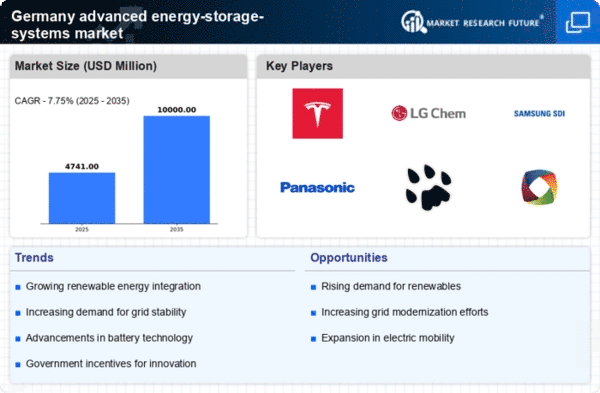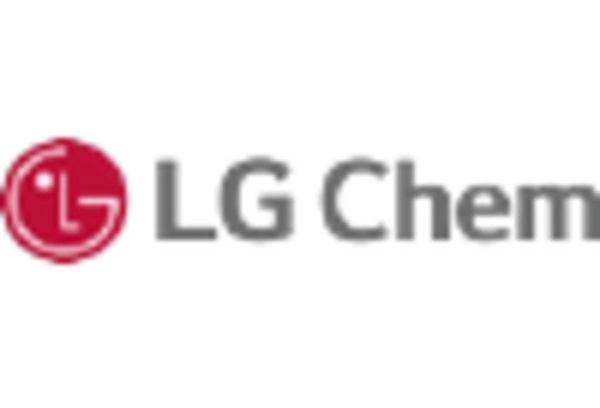Supportive Regulatory Frameworks
The regulatory environment in Germany is increasingly supportive of the advanced energy-storage-systems market. The government has implemented various policies and incentives aimed at promoting energy storage solutions, including subsidies for residential energy storage systems and favorable feed-in tariffs for renewable energy producers. These measures are designed to encourage investment in energy storage technologies and facilitate the transition to a more sustainable energy system. In 2025, it is anticipated that regulatory incentives will contribute to a 15% increase in the adoption of energy storage systems across various sectors. This supportive framework not only enhances market growth but also fosters innovation within the advanced energy-storage-systems market, as companies seek to develop solutions that align with regulatory requirements.
Growing Demand for Energy Independence
The advanced energy-storage-systems market in Germany is experiencing a notable surge in demand driven by the desire for energy independence. As energy prices fluctuate and geopolitical tensions rise, consumers and businesses alike are increasingly seeking solutions that allow them to generate and store their own energy. This trend is particularly evident in the residential sector, where homeowners are investing in solar panels coupled with energy storage systems. According to recent data, the market for residential energy storage systems in Germany is projected to grow at a CAGR of approximately 20% over the next five years. This growing demand for self-sufficiency is likely to propel the advanced energy-storage-systems market forward, as more individuals and organizations recognize the benefits of reducing reliance on traditional energy sources.
Technological Advancements in Energy Storage
The advanced energy-storage-systems market is significantly influenced by ongoing technological advancements. Innovations in battery technologies, such as lithium-ion and solid-state batteries, are enhancing energy density, efficiency, and lifespan. These improvements are crucial for both commercial and residential applications, as they allow for more effective energy management. In Germany, the development of new materials and manufacturing processes is expected to reduce costs by up to 30% over the next few years, making energy storage systems more accessible to a broader audience. Furthermore, advancements in smart grid technologies are facilitating better integration of energy storage systems with existing infrastructure, thereby optimizing energy use. This technological evolution is likely to play a pivotal role in shaping the future of the advanced energy-storage-systems market.
Rising Awareness of Environmental Sustainability
There is a growing awareness of environmental sustainability among consumers and businesses in Germany, which is positively impacting the advanced energy-storage-systems market. As climate change concerns escalate, stakeholders are increasingly prioritizing sustainable practices, including the adoption of energy storage solutions that complement renewable energy sources. This shift in consumer behavior is reflected in the rising demand for eco-friendly products and technologies. In 2025, it is estimated that approximately 40% of consumers in Germany are willing to invest in energy storage systems as part of their commitment to reducing carbon footprints. This heightened awareness is likely to drive growth in the advanced energy-storage-systems market, as more individuals and organizations seek to align their energy consumption with sustainable principles.
Increased Investment in Renewable Energy Infrastructure
Germany's commitment to renewable energy has led to substantial investments in infrastructure, which in turn fuels the advanced energy-storage-systems market. The government has set ambitious targets for renewable energy generation, aiming for 65% of total energy consumption to come from renewable sources by 2030. This shift necessitates the development of robust energy storage solutions to manage the intermittent nature of renewable energy sources like wind and solar. In 2025, investments in energy storage technologies are expected to reach €2 billion, reflecting a growing recognition of the importance of energy storage in achieving energy transition goals. As such, the advanced energy-storage-systems market is likely to benefit from these investments, enhancing the overall stability and reliability of the energy grid.
















